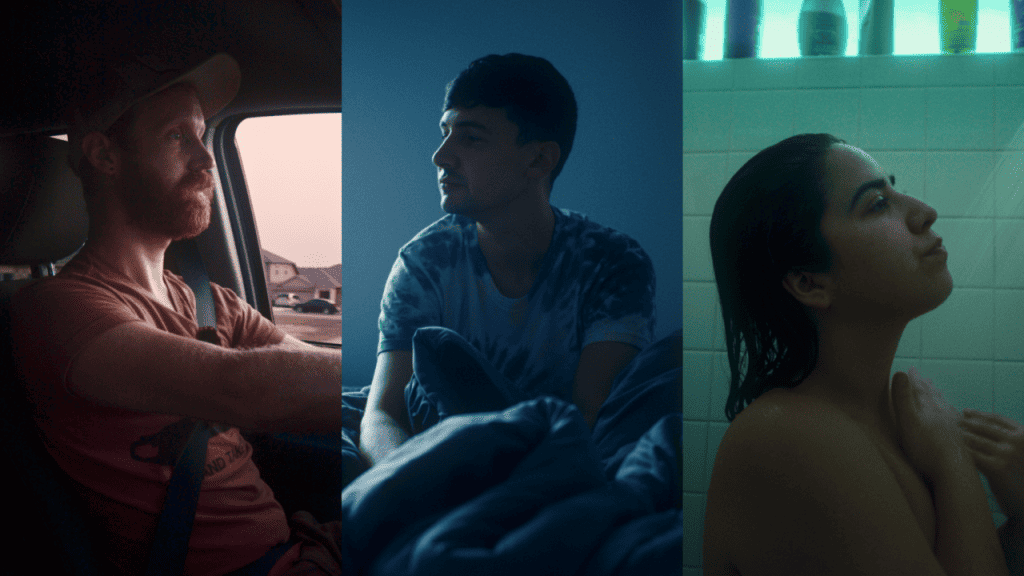Everyone you know who is in a successful relationship will tell you the same thing: “communication is key.” It’s tried and true wisdom, yet so many people seem to lose track of it. Maybe they’re bad communicators. Maybe, such as the case with Three Headed Beast, they literally don’t communicate at all. Writer-directors Fernando Andrés and Tyler Rugh boldly envision this subtext into text, stripping the story of dialogue for the majority of its runtime. It may grind on some viewers’ patience, but those who give it a chance will be treated to a compelling drama that is as well-acted as it is directed.
The film immediately establishes numerous subversive layers in its design. Dramas surrounding open relationships are not common, certainly not in the twenty-first century. Neither are dramas portraying openly bisexual couples comprised of a man and a woman. Three Headed Beast begins with both off the bat; Peter and Nina (Jacob Schatz and Dani Hurtado) have been in a long-term, open relationship for quite some time, long enough that it has become quotidian: they wake up, they go to work, Peter spends a night with his lover, Alex (Cody Shook), and he returns to find Nina waiting in bed.

It seems like a healthy relationship. Nina, a fit personal trainer and an avid listener of a relationship-advice podcast, is confident and forward-thinking. But something about Peter is aloof, even reckless. After a night of copious drinking with Alex, Peter returns home with a shaved head. Alex, meanwhile, is a young, single gay man hitting up the clubs of Austin for casual sex. He should be thriving, but it’s leaving him empty. Peter seems like a sure thing. But it’s more complicated than that.
This is an exceptionally unique relationship dynamic. Peter and Nina are adults, working day jobs and maintaining longevity in their relationship, while Alex is still stuck in his twenties, chasing the high and barely taking care of himself. Nina is a desirable partner, but it doesn’t give Peter an outlet to explore his sexuality with a man. Enter Alex, who begins as a side-piece but slowly evolves into something deeper. Naturally, this gives Nina unease; she currently isn’t seeing anyone else…but maybe she should be.
All of these tensions weave their way in and out of the story, plotted in subtle but meaningful strokes. With minimal dialogue, facial expressions do most of the talking. The three leads each have distinct personalities and physicalities and take their time to convey the important beats. Sometimes that can be stretched thin, though; after all, not every moment in a person’s life makes sense with no sound. Because of this, the lack of dialogue never quite feels diegetic in the film’s world, rather a restriction put on by the filmmakers. That doesn’t make it less admirable, but the overall immersion suffers as a result.

In the meantime, Andrés and Rugh establish a keen eye for visual storytelling. Evocative framing, bold color choices, and strong uses of split-screen help to elevate the film beyond a simple feature debut. The film’s momentary editing leaves plenty of extended takes for the actors to relish in, while the entire edit itself feels well-paced at a tight 83 minutes. Strong sound design also elevates the storytelling; with no dialogue to distract, even the simplest of noises or effects help to inform the story and the setting. Andrés and Rugh have an acute awareness of the most subtle details, all of which add to the honesty and complexity of the film’s central tensions.
Everything comes to a head around the middle of the film, when words finally emerge. It’s a scene so juicy in the context of the story that it shouldn’t be spoiled, but it was enough to launch this critic out of his seat in shock and excitement. It’s the movie’s crown jewel, an extended sequence with dialogue (dialogue does appear one additional time in the third act even though it really isn’t needed) that knows exactly how and when to use it. And then, like a fleeting memory, the silence resumes.
From then on, the film portrays a slow descent. It’s not conclusive, but a story so attuned to the minutiae of relationships knows damn well that very few things in life end that way. It’s far more tragic to leave something lingering, something ineffable. How fitting for a story without words.
Three Headed Beast had its World Premiere in the US Narrative Competition section of the 2022 Tribeca Film Festival.
Directors: Fernando Andrés, Tyler Rugh
Runtime: 83m
Cast: Cody Shook, Jacob Schatz, Dani Hurtado, Daniel Abramson, Paul Grant, Sarah J. Bartholomew
This tense indie drama uses strong visual storytelling and effective performances to convey its subversive cautionary tale.
-
8
-
User Ratings (0 Votes)
0

Larry Fried is a filmmaker, writer, and podcaster based in New Jersey. He is the host and creator of the podcast “My Favorite Movie is…,” a podcast dedicated to helping filmmakers make somebody’s next favorite movie. He is also the Visual Content Manager for Special Olympics New Jersey, an organization dedicated to competition and training opportunities for athletes with intellectual disabilities across the Garden State.






